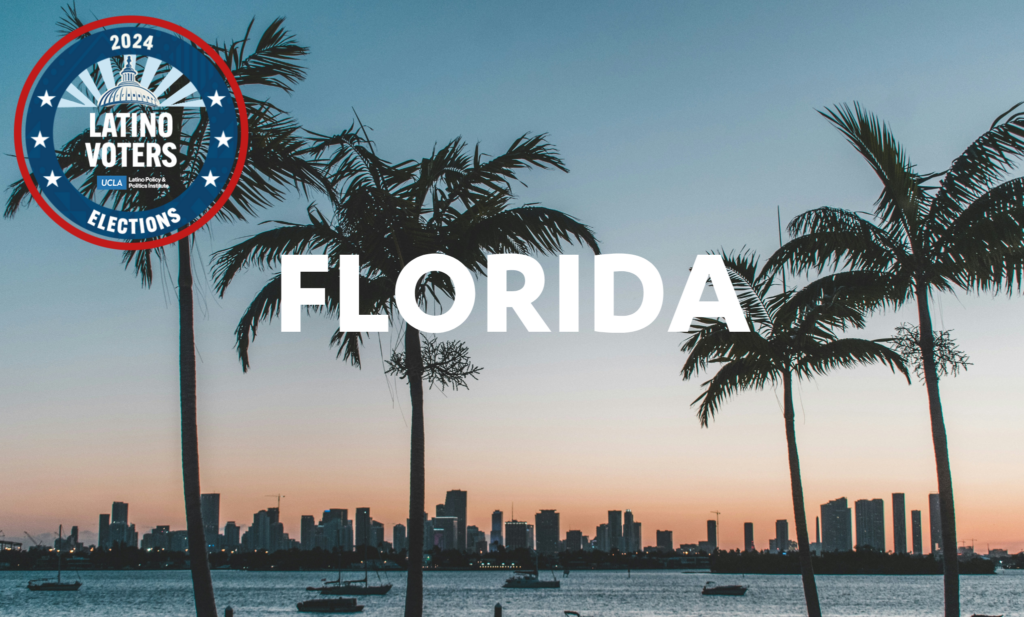FOR IMMEDIATE RELEASE
Contact: lppipress@luskin.ucla.edu
New UCLA LPPI Data Brief Shows Nearly 3.3 Million Eligible Latino Voters in Florida Key to Senate Control
Latino-eligible voters in the Sunshine state will be decisive not only for the presidential election but also for a competitive U.S. Senate race
LOS ANGELES (September 10, 2024) – The UCLA Latino Policy and Politics Institute (UCLA LPPI) released a new data brief on Latino eligible voters in Florida, marking the seventh in a series of data briefs utilizing the Latino Data Hub to focus on Latino voters in critical states and counties for the 2024 election.
Boasting the third-largest number of Latino-eligible voters in the U.S, the data brief of the key battleground state also provides deep insights into the diversity of the state’s Latino electorate through comparisons across Hillsborough, Miami-Dade, and Orange Counties. The brief details their demographic growth, economic participation, educational attainment, language proficiency, housing, health insurance, and connectivity. The key findings include:
- The Latino population in Florida is growing more rapidly than non-Latinos and accounts for more than one fifth of all eligible voters—making them the second-largest group after non-Hispanic whites.
- The Latino share of eligible voters in Florida’s Miami-Dade County is 64%, more than three times the share of those in the state overall.
- While Mexicans are the most common descent group of Latinos across the U.S., the most common in Florida are Cubans and Puerto Ricans. In Miami-Dade, Cubans alone are the majority of Latino eligible voters, and in Orange, Puerto Ricans alone are the majority.
- Latino eligible voters in Florida are about the same age as eligible voters overall. Young voters ages 18 to 24 are slightly more diverse than all eligible voters.
- Investing in Spanish-language outreach will be key to reaching Latino eligible voters in Florida. Four in five Latino eligible voters in Florida are Spanish speakers, including the 30% of Latinos who only speak Spanish. These high rates are more pronounced in Miami-Dade County where more than 90% of Latinos speak Spanish.
Additionally, the brief found that most Latino eligible voters in Florida are U.S.-born (57%), with a significant portion (43%) being naturalized citizens. The proportion of naturalized Latino voters is higher in Florida, particularly in Miami-Dade County, compared to the national average and other counties in the state. Latino eligible voters in Florida generally have higher levels of formal education than in the U.S., yet, compared to other major racial or ethnic groups within Florida, a larger share of Latino eligible voters, along with Black individuals, lack a high school diploma. Additionally, Latinos have the second-lowest rates of bachelor’s degree attainment in the state, following Black and Native American individuals. Despite their high work participation, Latino eligible voters in Florida earn the second-lowest hourly wages among all racial and ethnic groups, alongside Native Americans and just above Black individuals. They also experience challenges with housing affordability and more than half of Latino renters in the state face housing cost burdens. Furthermore, Latino eligible voters have higher uninsured rates than the overall eligible voter population and non-Hispanic whites. While the vast majority of Latino voters in Florida have access to the internet, a smartphone, and a vehicle, fewer have access to broadband internet.
See additional briefs as part of the 2024 election research series here.
###
About UCLA Latino Policy and Politics Institute
The UCLA Latino Policy and Politics Institute is a non-partisan research institute that seeks to inform, engage, and empower Latinos through innovative research and policy analysis. LPPI aims to promote equitable and inclusive policies that address the needs of the Latino community and advance social justice. latino.ucla.edu.












